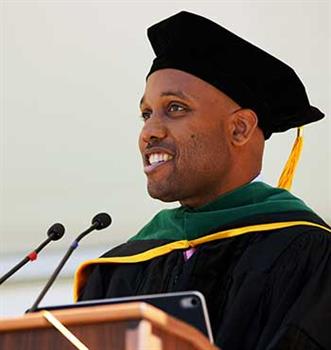(1/61)
(2/61)
(3/61)
(4/61)
(5/61)
(6/61)
(7/61)
(8/61)
(9/61)
(10/61)
(11/61)
(12/61)
(13/61)
(14/61)
(15/61)
(16/61)
(17/61)
(18/61)
(19/61)
(20/61)
(21/61)
(22/61)
(23/61)
(24/61)
(25/61)
(26/61)
(27/61)
(28/61)
(29/61)
(30/61)
(31/61)
(32/61)
(33/61)
(34/61)
(35/61)
(36/61)
(37/61)
(38/61)
(39/61)
(40/61)
(41/61)
(42/61)
(43/61)
(44/61)
(45/61)
(46/61)
(47/61)
(48/61)
(49/61)
(50/61)
(51/61)
(52/61)
(53/61)
(54/61)
(55/61)
(56/61)
(57/61)
(58/61)
(59/61)
(60/61)
(61/61)
Graduation 2019
University of Colorado School of Medicine
 (May 24, 2019) The impressive career that Tamaan Osbourne-Roberts, MD, FAAFP, built after graduating from the University of Colorado School of Medicine in 2007, followed times of adversity that ultimately taught him lessons that enriched his medical practice and his life.
(May 24, 2019) The impressive career that Tamaan Osbourne-Roberts, MD, FAAFP, built after graduating from the University of Colorado School of Medicine in 2007, followed times of adversity that ultimately taught him lessons that enriched his medical practice and his life.
Addressing the 158 graduating medical students and their family and friends at the School of Medicine's Hooding and Oath Ceremony, Osbourne, past president of the Colorado Medical Society, said he faced a devastating setback when he failed Step 2, a required medical licensure examination, on his first attempt.
That failure ended his hopes of pursuing a specialty in anesthesiology. Instead, he entered the field of family medicine.
"To this day it remains one of the most heart-breaking periods of my professional life," Osbourne-Roberts said. "It challenged my friendships, it challenged my relationships, it challenged my sense of self."
Family medicine, however, "turned out to be the 100 percent right place for me,” he said. “It helped me create an incredible career that likely would not have been possible for me, otherwise. I did survive and even thrive on the inauspicious start to my career, and I have gone on to help many people."
That realization led him to the first of three personal truths that he shared with graduates:
Perfection is not a prerequisite for success.
"This is a difficult lesson for us to learn as physicians because as gifted children, which most of you were, and as doctors which you now all are, we are known for perfection. We thrive on it. Our entire educational process from start to finish is built on the foundational myth that we can care for patients, flawlessly, while deprived of sleep and food, without help or assistance, and do so without error or misstep."
Once in residency, Osbourne-Roberts endured additional setbacks when he experienced racism while working in a rural Colorado hospital.
"I was still able to work through and help patients under my care," he said.
These obstacles became motivation and he said he learned another important lesson:
All wounds heal.
"This should be an easy thing for us to remember. After all, it's a key lesson from our profession. We ease suffering, and we cure the sick, and we help mend bodies. But we often forget the same is true of us and our wounds, both physical and metaphysical."
After residency, he took three months off to care for his infant son. He realized he needed to learn self-care because the profession of medicine can be "bruising."
"That's a lesson I myself had to learn, and one that each of you must learn, too, or you will harm yourselves, and eventually end up harming your patients."
Overcoming the challenges, giving himself time to heal, led him a third lesson:
Nothing lasts forever.
"As physicians, as vanguards against suffering, and as gatekeepers of whatever lies beyond this mortal coil, we see on so many days that life is incredibly fleeting. At the end of it all, all we have is each other. The moments we've had together."
Class Speaker Meryl Colton echoed that sentiment to her classmates, who she said inspired and supported her for the last four years.
"Medical school was filled with moments that made us doubt our abilities. Doubt our knowledge, our physical skill, and passion for medicine. I think everyone I know had moments where they fell short of their expectations."
Classmates learned to rely on each other, and she encouraged them to continue to do so in the years ahead.
"I hope you remember this community, the class of 2019 that got to see what absolutely special people you are. Wherever you go, we're just a short text or even phone call away, and we would gladly shoulder the burden of reminding you just how amazing you are."
School of Medicine Dean John J. Reilly, Jr., MD, told graduates that medicine has become a unique career in our fragmented culture because it is one of the few professions that cares for all segments of society.
"You will be a trusted counselor and guide to people from all walks of life, from all kinds of backgrounds. I would venture to say that 10 years from now because of the financial success that physicians enjoy in our society, you might be the only person in your neighborhood who actually knows someone who is on Medicaid, who actually has had a meaningful conversation with a homeless person in the last month.
"You also have a special role in helping us reshape our medical system. There are strong economic imperatives to change the way we deliver medical care, and it's important that the people who deliver medical care advocate for the people who need medical care. If we leave this in the hands of people who are interested in finance, we will wind up with a system that none of us want to practice in and none of us want to be patients in."
Read About Our Incoming Students
Progress Asoluka - . Healthcare workers' neglect of his mother and younger sister spurred an interest in a health career.
Boston Gubler - .Befriending a stranger while on a mission in Chile prompted a change in career plans from business to medicine.
Bianca Sanchez - .A first-generation college graduate, Sanchez credits an internship with giving her confidence to pursue medicine.